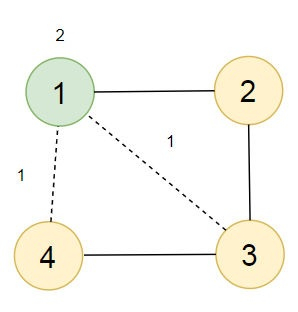
 Data Structure
Data Structure Networking
Networking RDBMS
RDBMS Operating System
Operating System Java
Java MS Excel
MS Excel iOS
iOS HTML
HTML CSS
CSS Android
Android Python
Python C Programming
C Programming C++
C++ C#
C# MongoDB
MongoDB MySQL
MySQL Javascript
Javascript PHP
PHP
- Selected Reading
- UPSC IAS Exams Notes
- Developer's Best Practices
- Questions and Answers
- Effective Resume Writing
- HR Interview Questions
- Computer Glossary
- Who is Who
Program to find out the minimal cost so that the citizens have access to a market in Python
Suppose, there is n number of cities and m roads connecting the cities. The citizens of the people need markets where they can buy their commodities. Now, there are no markets in the cities, and the roads between the cities are under construction.A two-way road can be built between two cities if (i) The city contains a market; (ii) The cities can be visited by the road where there is a market. The cost of building a road is x, and building a market is y and they are given. We have to find out the minimal cost to provide access to markets to citizens of each city. The array 'cities' contains information about the cities about which cities can be connected by road.
So, if the input is like n = 4, m = 3, x = 1, y = 2, cities = [[1, 2], [2, 3], [3, 4]], then the output will be 4.

Here, we can see four cities 1, 2, 3 and 4. If a market is built a t city 1, and two more roads are built between (1, 4) and (1,3) the total cost will be 2 + 1 + 1 = 4. This is the minimum cost.
To solve this, we will follow these steps −
- if x <= y, then
- return n * x
- otherwise,
- adj_list := a map containing lists as elements
- for each city in cities, do
- city1 := city[0]
- city2 := city[1]
- insert city2 at the end of adj_list[city1]
- insert city1 at the end of adj_list[city2]
- temp := a new list of size (n + 1) initialized with value True
- value := 0
- dq := a double ended queue
- for cur in range 1 to n + 1, do
- if temp[cur] is non-zero, then
- value := value + x
- insert cur at the rightmost end of dq
- temp[cur] := False
- while dq is not empty, do
- for each i adj_list[extracted leftmost element of dq], do
- if temp[i] is non-zero, then
- insert i at the rightmost end of dq
- temp[i] := False
- value := value + y
- if temp[i] is non-zero, then
- if temp[cur] is non-zero, then
- return value
Example
Let us see the following implementation to get better understanding −
from collections import defaultdict, deque
def solve(n, m, x, y, cities):
if x <= y:
return n * x
else:
adj_list = defaultdict(list)
for city in cities:
city1 = city[0]
city2 = city[1]
adj_list[city1].append(city2)
adj_list[city2].append(city1)
temp = [True] * (n + 1)
value = 0
dq = deque()
for cur in range(1, n + 1):
if temp[cur]:
value += x
dq.append(cur)
temp[cur] = False
while dq:
for i in adj_list[dq.popleft()]:
if temp[i]:
dq.append(i)
temp[i] = False
value += y
return value
print(solve(4, 3, 1, 2, [[1, 2], [2, 3], [3, 4]]))
Input
4, 3, 2, 1, [[1, 2], [2, 3], [3, 4]]
Output
4

